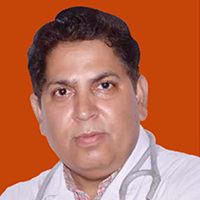

Successful Treatments
Clinics
Doctors
What is Thrombosis?
Thrombosis is a medical condition that occurs when a thrombus, or blood clot, forms inside a heart chamber or blood vessel. The clot can block the blood flow where it is formed. The clot can move to another part of the body. If left untreated, thrombosis can lead to severe complications like stroke, heart attack, or organ damage.
Types of Thrombosis
Depending on where the blood clot originates, thrombosis can be roughly divided into various types such as:
Arterial thrombosis: It occurs in the arteries and may cause clots in the heart, brain, or peripheral arteries. Its types include coronary thrombosis, cerebral thrombosis, and peripheral artery thrombosis, among others, that cause heart attacks, strokes, and peripheral artery disease.
Venous thrombosis: It is the phenomenon that occurs in veins returning the deoxygenated blood from the body to the heart. Its types include deep vein thrombosis, pulmonary embolism, superficial vein thrombosis, and portal vein thrombosis, resulting in complications, artery blockage, liver malfunction, and inflammation.
Renal vein Thrombosis: When a clot is formed in the renal veins, then it causes damage to the kidney.
Cavernous sinus thrombosis: It is a rare disorder resulting from a blood clot that forms in the cavernous sinus, a significant vein located at the base of the brain. This may cause serious complications, including a stroke or loss of eyesight.
Causes of Thrombosis
Several conditions can interfere with the usual equilibrium of blood clotting, leading to thrombosis. These elements are commonly known as Virchow's triad, and they consist of:
Hemodynamic Changes: Blood Turbulence, uneven blood flow, stasis, or slowing or stopping of blood flow, can cause the formation of a clot.
Vessel Wall Injury: Even minimal damage to the endothelium, the innermost lining of the blood vessel, can activate clots.
Altered Blood Coagulation: Thrombosis risk may be increased by conditions that make blood clot too readily (hypercoagulability).
Symptoms of Thrombosis
Thrombosis can lead to symptoms that can be either mild or serious, depending on its location and type. Symptoms of different types of Thrombosis are mentioned below:
Have you noticed any of the following symptoms?
- You are having breathing difficulties
- Pain in the center or left side of the chest
- Swelling and Pain in one leg or arm
- Headache and weakness
- Hardening of the vein
Jiva Ayunique™ Treatment Philosophy - A Holistic Approach for Treatment of Thrombosis
A scientific evidence-based treatment for Thrombosis is provided at Jiva Ayurveda. The treatment programs are designed to cure the disease from the root and not just the symptoms and would be concerned with stability, balance, and the kind of holistic healing.
Core Principles of the Jiva Ayunique™ Treatment Protocol
HACCP-certified Ayurvedic Medicine: The scientifically formulated mixtures consisting of active ingredients will help an individual maintain their emotional balance.
Mindfulness practice: Yoga and meditation are the soft approaches which will help in achieving general wellness and mental health.
Ayurvedic treatments: They involve Panchakarma massages and other therapies that will promote emotional well-being and detoxification.
Diet and Lifestyle Counseling: Make dietary and behavioral changes that will help improve health according to specialists recommendations.
Ayurvedic Medicines for Thrombosis
The problems related to Thrombosis can be very well cured by using HACCP-certified Ayurvedic medicines provided by Jiva Ayurveda. This Ayurvedic medicine is prepared by the following commonly available plants:
Arjuna or Terminalia Arjuna: It is a plant which helps in strengthening the cardiac muscles and improving the blood circulation, thereby protecting the heart.
Boerhavia diffusa: It is known as punarnava in the vernacular, and is a rejuvenating herb which decreases fluid retention which in turn improves the functioning of the heart. It is also known for its anti-inflammatory and diuretics which help in reducing swelling and improving the flow of blood.
Gotu Kola: It is a popular Ayurvedic herb which improves circulation and reduces inflammation, making it beneficial for treating thrombosis. It enhances blood flow, reduces inflammation, and strengthens blood vessels, preventing clot formation.
Curcumin: It is the active ingredient of spice turmeric, having great potential for the management of thrombosis because it is an anti-inflammatory and anticoagulant agent which reduces inflammation, prevents clot formation, and promotes blood flow.
Frequently Asked Questions About Thrombosis
What is acute Thrombosis?
Acute thrombosis is a sudden formation of a blood clot in a blood vessel that can partially or completely obstruct the flow of blood, and can affect either veins or arteries. This has to be treated speedily because it may cause significant problems.
What is ICD 10 code for deep vein thrombosis?
ICD 10 is the 10th revision done during the international classification of Diseases in which acute deep vein Thrombosis was classified under code I82.4.
What is Venous sinus Thrombosis?
Venous sinus thrombosis, more commonly known as cerebral venous sinus thrombosis (CVST), is one of those rare strokes which arises when there is a blood clot in the venous sinuses of the brain. If this clot somehow manages to plug one or more of the sinuses, then the pressure of the blood vessels is elevated which would obstruct the blood from draining out of the brain, leading to hemorrhage and edema of the brain.
What is Lateral sinus Thrombosis?
Lateral sinus thrombosis is an infrequent but dangerous disorder, in which a blood clot develops in the lateral sinus which is the main venous channel in the brain to return blood from it toward the heart. The increased intracranial pressure caused by this condition may lead to extreme headaches and blurred vision along with other neurological symptoms.
What is thrombosis with thrombocytopenia syndrome?
Thrombosis with thrombocytopenia syndrome, or rather vaccine-induced immune thrombotic thrombocytopenia (VITT) is associated with an exceptionally low count of platelets, or thrombocytopenia, and the development of blood clots, known as thrombosis. It was first recognized to be a side effect of some of the COVID-19 vaccinations.
What is Stent Thrombosis?
Sometimes, a blood clot forming inside the lumen of the stent- a small, mesh-like tube placed in an artery to keep open the lumen and promote better flow of blood to the heart- causes a rare but dangerous side effect called stent thrombosis.
Is Thrombosis dangerous?
Thrombosis is a dangerous condition that exposes patients to risks such as heart attacks, strokes, and pulmonary embolism. Its long-term complications include Post-Thrombotic Syndrome that may eventually lead to Chronic Venous Insufficiency with chronic pain, swelling, and ulcers in limbs. It depends on the location and the extent of the blood clot.
What are the Ayurvedic medicines for Thrombosis?
Some of the natural herbs such as Arjuna, Boerhavia diffusa, Gotu Kola, and Curcumin are commonly used in the formulations of Ayurvedic medicines. Among them Arjuna strengthens cardiac muscles, Boerhavia diffusa decreases fluid retention, Gotu Kola improves circulation, reduces inflammation, and strengthens the blood vessels, while Curcumin is an anti-inflammatory and anticoagulant agent in turmeric.
Is it possible that Ayurvedic medicine for Thrombosis has side effects?
In some rare cases, the ayurvedic medicines may cause side effects such as nausea, diarrhea, and can lead to some allergic reactions. Therefore, it is recommended to take the supervision of a licensed Ayurvedic specialist before using them.
Top Ayurveda Doctors
Our Happy Patients
Social Timeline
Home Remedies
- मसूड़ों की सूजन और दर्द का आयुर्वेदिक इलाज - घरेलू नुस्खे और मुफ़्त परामर्श
- डेंगू से कमजोरी? आज़माएं ये आयुर्वेदिक घरेलू नुस्खे और पाएं मुफ़्त परामर्श
- क्या कोरोना के लक्षण महसूस हो रहे हैं? ये आयुर्वेदिक नुस्खे देंगे राहत
- नाक बंद और भारी सिरदर्द? आज़माएं ये घरेलू नुस्खे, असर तुरंत
- स्ट्रेस, थकान या माइग्रेन? ये आयुर्वेदिक नुस्खे देंगे सिरदर्द से छुटकारा
- दाँत में झनझनाहट या कैविटी का दर्द? ये आयुर्वेदिक नुस्खे देंगे राहत
- Home Remedies for Headache
- Home Remedies for Sensitive Teeth
- Home Remedies for Tooth Cavity
- Home Remedies for Dengue
- Home Remedies for Corona
- Home Remedies for Cold
- Home Remedies for Burning Feet
- Home remedies for Migraines
- Home Remedies For Fever
Related Disease
- Ayurvedic Treatment for Obesity
- Ayurvedic Treatment for Migraine
- Ayurvedic Treatment for Heat Stroke
- Ayurvedic Treatment for Paralysis
- Ayurvedic Treatment for Mastitis
- Ayurvedic Treatment for Gangrene Foot
- Ayurvedic Treatment for Granuloma
- Ayurvedic Treatment for Amyloidosis
- Ayurvedic Treatment for Thrombocytopenia
- Ayurvedic Treatment for Dengue
- Ayurvedic Treatment for Measles
- Ayurvedic Treatment for Fistula in Ano
- Ayurvedic Treatment for Malaria
- Ayurvedic Treatment for Plantar Fasciitis
- Ayurvedic Treatment for Chikungunya
- Ayurvedic Treatment for Sepsis
- Ayurvedic Treatment for Addison's Disease
- Ayurvedic Treatment for Eye Floaters
- Ayurvedic Treatment for Eye Flu
- Ayurvedic Treatment for Herpes
- Ayurvedic Treatment For Teeth Cavities
- Ayurvedic Treatment for Tooth Pain
- Get Ayurvedic Treatment for Vertigo
- Get Ayurvedic Treatment for Thrombosis
- Ayurvedic Treatment for Corona
- Ayurvedic Treatment for Ascites
Latest Blogs
- Migraine और भोजन का समय: देर से खाना सिरदर्द को क्यों बढ़ा देता है?
- क्या एंटीबायोटिक लेने के बाद पाचन पूरी तरह बिगड़ गया? आयुर्वेद के अनुसार Colitis के उपचार जानें
- अगर मामूली आहार भी पाचन तंत्र सहन न कर पाए तो Colitis को हल्का क्यों नहीं मानना चाहिए? आयुर्वेदिक दृष्टि से जानें
- लंबे समय से सक्रिय Colitis क्यों शरीर की रिकवरी क्षमता को कमज़ोर कर देती है? आयुर्वेदिक नज़र से जानें
- नॉर्मल एंडोस्कोपी, नॉर्मल रिपोर्ट्स… फिर भी रोज़ दर्द—IBS में गलत इलाज कैसे बीमारी को Chronic बना देता है! आयुर्वेदिक उपचार समझें
- क्या बाहर का खाना या मसालेदार भोजन आपके IBS को तुरंत ट्रिगर कर देता है? आयुर्वेदिक दृष्टि से समझें और कब Ayurvedic doctor से मिलना चाहिए जानें
- IBS में दवाइयाँ काम क्यों नहीं करतीं? आयुर्वेदिक कारण और उपचार समझें
- कभी कब्ज़, कभी दस्त: यह सिर्फ पाचन नहीं, पूरे सिस्टम का असंतुलन हो सकता है! जानें कब Ayurvedic doctor से मिलना ज़रूरी हो जाता है
- क्या सर्दियों में दवाइयों के बावजूद साँस पूरी नहीं खुलती? अस्थमा की जड़ आयुर्वेद से समझें
- क्या धूल, धुआँ या परफ्यूम से तुरंत साँस लेने में तकलीफ़ होती है? Asthma के ट्रिगर आयुर्वेद की नज़र से समझें
- सर्दियों में अस्थमा क्यों ज़्यादा बिगड़ जाता है? ठंडी हवा और कफ-वृद्धि का आयुर्वेदिक कारण जानें
- क्या ठंडी हवा लगते ही सीने में जकड़न और साँस लेने में परेशानी होती है? अस्थमा को आयुर्वेद की नज़र से जानें
- क्या सुबह उठते ही बलगम के साथ खाँसी आना अस्थमा का संकेत है? आयुर्वेद से समझें
- क्या लंबे समय तक लैक्सेटिव का उपयोग आपकी कब्ज़ को और जटिल बना रहा है? आयुर्वेदिक समाधान जानें
- क्या गैस, पेट फूलना और सिरदर्द का साथ में होना Chronic Constipation का क्लासिक पैटर्न है? आयुर्वेदिक व्याख्या समझें
- क्या सुबह नींद खुलते ही पेट साफ न होना ‘धीमी अग्नि’ का संकेत है? दीर्घकालिक कब्ज़ में आयुर्वेदिक कारण जानें next topic
- क्या लंबे समय तक बैठकर काम करने से आपकी कब्ज़ लगातार बढ़ रही है? आयुर्वेदिक दृष्टिकोण देखें
- क्या कब्ज़ के चलते आपकी नींद, ऊर्जा और पाचन सब प्रभावित हो रहे हैं? आयुर्वेद में इसके मूल कारण और ज़रूरी उपाय जानें
- क्या तनाव और चिंता भी Chronic Constipation का छुपा हुआ कारण बन सकते हैं? आयुर्वेदिक दृष्टि देखें
- क्या कई दिनों तक कठोर स्टूल बनना और पेट में ऐंठन रहना Chronic Constipation की पहचान है? आयुर्वेदिक संकेत समझें
Ayurvedic Doctor In Top Cities
- Ayurvedic Doctors in Bangalore
- Ayurvedic Doctors in Pune
- Ayurvedic Doctors in Delhi
- Ayurvedic Doctors in Hyderabad
- Ayurvedic Doctors in Indore
- Ayurvedic Doctors in Mumbai
- Ayurvedic Doctors in Lucknow
- Ayurvedic Doctors in Kolkata
- Ayurvedic Doctors in Patna
- Ayurvedic Doctors in Vadodara
- Ayurvedic Doctors in Ahmedabad
- Ayurvedic Doctors in Chandigarh
- Ayurvedic Doctors in Gurugaon
- Ayurvedic Doctors in Jaipur
- Ayurvedic Doctors in Kanpur
- Ayurvedic Doctors in Noida
- Ayurvedic Doctors in Ranchi
- Ayurvedic Doctors in Bhopal
- Ayurvedic Doctors in Ludhiana
- Ayurvedic Doctors in Dehradun









































